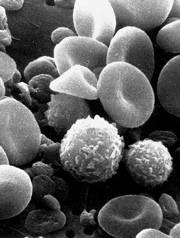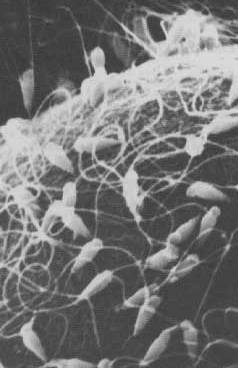Cell
Basic unit of life
Online Biology Dictionary
|
|

|
|
Prokaryotic cell |

|
|
Human blood cells |

|
| Spermatozoa swarming an ovum |
The cell is to biology what the atom is to chemistry. All living things other than viruses are composed of cells. They are membrane-bounded compartments, usually microscopic, filled with a complex liquid called cytoplasm. Within the cytoplasm are various structures with specific functions.
Broadly speaking, all cellular organisms can be divided into two categories, prokaryotes and eukaryotes (viruses, which are not cellular, constitute an additional major category).
Many eukaryotes are multicellular (animals, plants, and most fungi). That is, they are organisms composed of multiple cells. There are also many single-celled eukaryotes. Eukaryotic chromosomes are linear and enclosed in a nuclear envelope. A prokaryotic chromosome is single, circular, and not so enclosed (see figure left).occurrence in disease.
Most shared on Macroevolution.net:
Human Origins: Are we hybrids?
On the Origins of New Forms of Life
Mammalian Hybrids
Cat-rabbit Hybrids: Fact or fiction?
Famous Biologists
Dog-cow Hybrids
Georges Cuvier: A Biography
Prothero: A Rebuttal
Branches of Biology
Dog-fox Hybrids